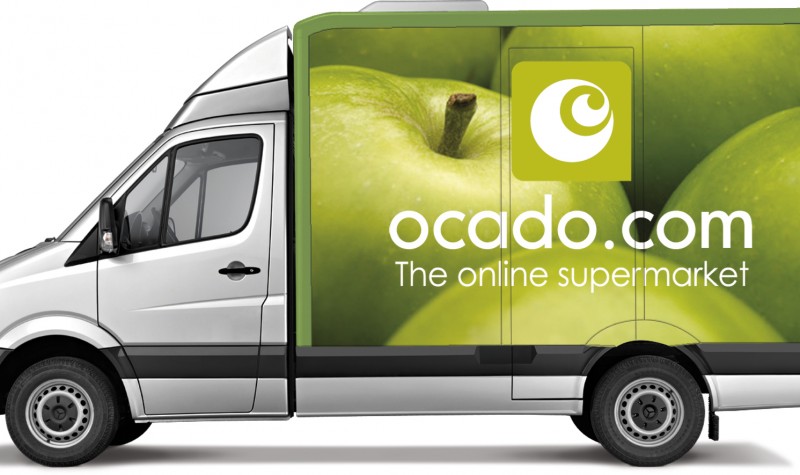Ocado – can its push to remove posh image help the company?

With its half year results announced last week, it is a good time to look at the fortunes of Ocado, somewhat of a black sheep in a much beleaguered sector.
Like the rest of the sector, a big fall from the end of February last year (in Ocado’s case from £6.24 at its peak to a nadir of £2.18 in mid-October) gave way to a minor recovery across the end of 2014 (up to £4.34 by the start of 2015) and a rather flat 2015 (Ocado has largely trading in a bracket between £3.50 and £4, a bracket it finally escaped in the last week of June).
Yet unlike the companies it is lumped in with, Ocado is solely a delivery based services, making it different to Tesco, Sainsbury’s, Morrisons and Marks & Spencer (the food division of the latter being its closest tradable rival). This doesn’t mean it isn’t immune to the same sector-sapping issues as its bigger rivals; in fact its partnerships with Waitrose and Morrisons mean their fates are intrinsically linked. Yet there are unique aspects specific to the online business that mean a comparison is worth making.
Beyond sector specific problems, the main issue with Ocado is the poshness factor, a trait that pushes it closer to Waitrose and M&S Food than the Big Four or the bargain upstarts like Aldi and Lidl. Yet currently Ocado helps play a similar role in the sector to those cheaper supermarkets. If you place Tesco, Sainsbury’s, Asda and Morrisons in the middle of the spectrum, it becomes clearer to see why they might be struggling more than their smaller rivals. From each side of the income divide the Big Four are being squeezed; bargain hunters are drawn to the lower prices of the German double-act, whilst those looking for something a bit fancier (and a bit more expensive) have more interest in the aforementioned M&S/Waitrose/Ocado trifecta than they do in the supermarket behemoths.
Of course, the chunk of the market the Big Four possess is still relatively unrivalled, but the impact this squeeze is having is noticeable to any shopper, even if it is the bottom end of the spectrum that is causing the biggest waves. Interestingly, however, Ocado is aiming for a larger piece of the pie by trying to eliminate the very aesthetic that makes it stand out from the deluge of supermarkets in the UK. Instead of maintaining the idea it offers food oozing with exclusivity, something M&S and Waitrose are experts at, it is now aiming for the kind of universality so integral to whatever successes the Big Four have left.
So far this change of tact is yielding results. Despite a year-on-year the slip in profits from £7.5 million to £7.2 million for the 6 months to May, something Ocado blamed on investment costs, this minor decline was compensated for by a hefty 15.7% leap in sales to £511.9 million. Perhaps more important than both of these figures, and the number that shows Ocado’s current intentions, is its new customer growth, which jumped by 30%. Combine this with its Morrisons partnership yielding impressive growth annually, and where Ocado feels its future lies is clear, at least in the UK.
Yet investors increasingly want the long-rumoured international deals Ocado has in the making to come to fruition, and the lack of reference to this issue in the most recent half year report was frustrating in its absence. Ocado prides itself on being the largest online-only grocer, a sector that the Institute of Grocery Distribution expects to double to £17 billion in the next half a decade, and has discussed internationally selling its technology with ‘a number of parties’.
With its experience in the home-delivery savvy UK, Ocado is primed to become a global player in a division that is expected to become 9% of the grocery sector as a whole in the next few years. It’s the kind of move that will further differentiate Ocado from its brick and mortar rivals, even as it chases at bigger part of that grocery middle ground back at home. What will be interesting to observe is if any progress on this international front can help Ocado further escape the clutches of its struggling sector, or whether it will leave the company overstretched in the long run.
Keep track of the latest movements in Ocado, Tesco, Morrisons, among a host of other stocks, currencies and indices, at Spreadex!
Promoted by Spreadex
Spread betting carries a high level of risk to your capital and can result in losses larger than your initial stake/deposit. It may not be suitable for everyone so please ensure you fully understand the risks involved.
Spreadex Ltd is authorised and regulated by the Financial Conduct Authority, provides an execution only service and does not provide advice in any way. Nothing within this blog post should be deemed to constitute the provision of investment advice, recommendations, any other professional advice in any way, or a record of our trading prices.
Comments (0)